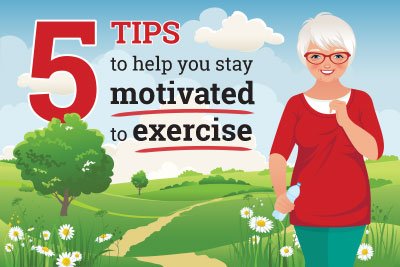Staying Motivated to Exercise: Tips for Older Adults
Tips for older adults to stay motivated to exercise
Physical activity is a great way for older adults to gain substantial health benefits and maintain independence. Try to make exercise a priority. Remember that being active is one of the most important things you can do each day to maintain and improve health. Try these tips to help you stay motivated to exercise.
1. Find simple ways to make exercise fun and enjoyable

Some people like to walk on a treadmill at the gym. Others find that kind of activity boring. The key to sticking with exercise is to make it interesting and enjoyable. Be creative. Do things you enjoy but pick up the pace. Do all four types of exercise — endurance, strength, balance, and flexibility. The variety helps keep things interesting! Try some new activities to keep your interest alive.
2. Find ways to fit exercise into your day
You are more likely to exercise if it’s a convenient part of your day. Try exercising first thing in the morning. Combine physical activity with a task that’s already part of your day, such as walking the dog or doing household chores. If you don’t have 30 minutes to be active, look for three 10-minute periods. As you progress, add more 10-minute sessions until you hit your goal!
-
Work out at work
There are many ways to fit physical activity into your regular schedule, even while you are at work! Look for easy ways to add physical activity to your regular schedule:
- Take the stairs instead of the elevator.
- Take a walk with co-workers during your lunch break. An exercise buddy can help you stick with your plan to be more active!
- Walk down the hall and talk with a co-worker instead of sending an e-mail.
- Park a little farther away from your office and enjoy the walk.
- Join your company’s fitness center if there is one.
Search for Move Your Way: Tips for Busy Days on YouTube for more tips on fitting more activity into your day.
3. Make exercise a social activity
Many people agree that an “exercise buddy” keeps them going.
- Take a walk during lunch with coworkers.
- Try a dance class — salsa, tango, square dancing — it’s up to you.
- Use family gatherings as a time to play team sports or do outdoor activities.
4. Keep track of your exercise progress
The best way to stay motivated is to measure and celebrate your successes:
- Make an exercise and physical activity plan that works for you and track your daily physical activity. (PDF, 345K)
- Find new ways to increase your physical activity.
- Keep track of your monthly progress to see improvement. (PDF, 675K)
- Update your exercise plan as you progress.
-
Quick tip: Rewards for being active
Don’t forget to build rewards into your plan. Write down something you will do for yourself when goals are achieved. Treat yourself to something special: a movie, a trip to the museum, a new audiobook, or a massage. Celebrate your successes!
Tips for coping with breaks in your exercise routine
It is normal to have life events and changes get in the way of staying active. However, there are ways to get yourself back on track. Remember, to get the most out of exercise and physical activity, they need to be a regular part of your life.
| Change type | Temporary | Permanent |
|---|---|---|
| A change in your situation | You're on vacation:
|
Your usual exercise buddy moves away:
|
| A change in your health | The flu keeps you out of action for a few weeks:
|
You are recovering from hip or back surgery:
|
You may also be interested in
- Exploring fun ways to stay physically active
- Sharing this infographic on ways to overcome exercise barriers
- Finding more tips for healthy aging
Sign up for e-alerts about healthy aging
For more information about exercise and physical activity
American Council on Exercise
888-825-3636
receptionist@acefitness.org
www.acefitness.org
American College of Sports Medicine
317-637-9200
publicinfo@acsm.org
www.acsm.org
Centers for Disease Control and Prevention (CDC)
800-232-4636
888-232-6348 (TTY)
cdcinfo@cdc.gov
www.cdc.gov
This content is provided by the NIH National Institute on Aging (NIA). NIA scientists and other experts review this content to ensure it is accurate and up to date.
Content reviewed:
April 03, 2020


